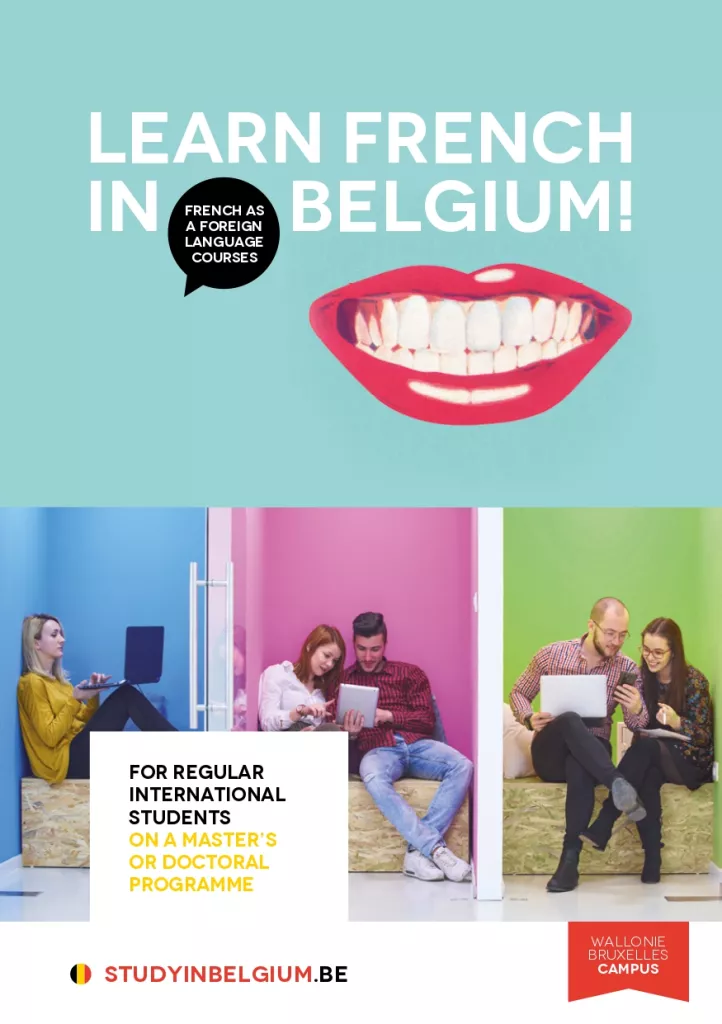And what if you want to make the most of your stay in the Wallonia-Brussels Federation to learn French?
Although many of the Master’s degree courses are delivered partially or entirely in English, the higher education institutions of the Wallonia-Brussels Federation are French-speaking! The language used for teaching and the everyday environment is therefore mainly French. By choosing to study in French-speaking Belgium, you can thus enjoy a unique opportunity to improve your French, making progress every day in the cosmopolitan world of Belgium!
Knowledge of French to study in French-speaking Belgium
If you are enrolled as a student on a French Bachelor’s degree course, you do not need to provide evidence of being able to speak French, except for the following three teaching courses:
- Bachelor’s degree: certified lower secondary education teacher;
- Bachelor’s degree: primary school teacher;
- Bachelor’s degree: preschool teacher.
If you are enrolled as a student on a French Master’s degree course, your French will need to be at B2 (upper intermediate) level, as defined by the Common European Framework of Reference for Languages (CEFR). You will need to pass a standardised test: DALF (C1), DELF (B2), TEF (level 4) or TCF (B2).
Please note that students wishing to study to become teachers (teaching Master’s degree or upper secondary school teaching certificate), must provide evidence of having C1 level in French.
Provide proof of understanding sufficient French
Proof can be provided in the form of:
- a certificate, diploma or specific attestation (information will be available from the higher education institution of your choice);
- successfully passing a specific exam, organised to this end by the academic authorities following the instructions given by the government;
- a certificate of having passed other French tests;
- a foreign diploma, qualification or certificate sanctioning studies that include sufficient levels of teaching in French;
- a higher education certificate issued in the Wallonia-Brussels Federation showing studies, access to which is conditional on proving sufficient Mastery of French.
The following do not need to demonstrate their level of French:
- students whose mother tongue is French;
- nationals of countries whose official language is French;
- students who have acquired at least 45 credits in a course taught in French;
- students applying for courses taught completely in English.

Improving your French during your study year in French-speaking Belgium
To help foreign students improve their French, some institutions organise language courses or conversation tables during the summer holidays and/or academic year. For more information, take a look at our “Learning French” brochure or speak to the registration service of your chosen higher education institution.
Studying in English, in French-speaking Belgium
If you wish to study for a Master’s degree, please be aware that some courses are delivered and assessed in a language that is not French (most often, English). There are also courses that are taught and assessed entirely in English, German or Dutch. This applies, for example, in specialist Bachelor’s degrees and specialist Master’s degrees, as well as in some other courses meeting specific criteria. No knowledge of French is required for these programmes.
Providing evidence of knowledge of the language studied
If you enrol on a course that is entirely or partially delivered in English, you will need to provide the chosen higher education institution with evidence that you have B2 level knowledge of the language. To do so, evidence of having passed a standardised TOEFL or IELTS test is generally accepted.
The following tests and scores are accepted (equating to B2):
TESTS | SCORES B2 |
IELTS | 5.5 - 6.5 |
TOEFL (paper) | 567 - 633 |
TOEFL iBT | After 2019: 72 - 95 |
TOEIC | 785 - 940 |
Cambridge FCE (First Certificate in English) | > 160 |
Cambridge CAE (Certificate of Advanced English) | > 180 |
Please note: there is no hard and fast rule common to all higher education institutions setting admission criteria in relation to language skills. We would therefore recommend that you contact the registration service of the institution chosen to find out exactly what it requires. This is particularly important if you wish to study for a PhD, where an ability to speak French is generally not required as the thesis can be written in English.

 Québec
Québec
 Maroc
Maroc
 Chile
Chile
 Brazil
Brazil
 Canada
Canada